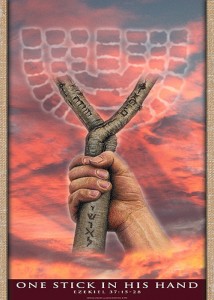Deuteronomy 29:15, Not here with us today. The Jewish sages teach that YHVH made his covenant not only with the Israelites present there that day, but with all those who would live in the future. What are the implications of this with regard to your life? How does it impact what you do, how you act, your attitude and relationship with your Maker to know that covenants were made 3500 years ago that have a bearing on our lives today as Redeemed Israelites?
“I’m not an Israelite; I’m a Gentile,” you say. “I have no obligation toward the Torah.” The idea that a born again believer is still a Gentile — a lie that the church system has gotten most Christians to believe — isn’t biblically substantiated. Well, who did Paul say that believers are? (Read Rom 4:16; 9:8; Gal 3:7, 9, 14, 28–29.) In Ephesians 2, he calls them the “one new man” and part of the nation of Israel. And who are the ex-Gentiles that Paul talks about who were aliens to the covenants (plural, referring to the Abrahamic Covenant revealing the path to salvation, the Mosaic Covenant revealing the path of righteousness and the New Covenant, which is the previous two covenants written on our spiritually circumcised hearts) of Israel, but have now been brought into the commonwealth of Israel through the work of Yeshua? (See Eph 2:11–19.) Remember, there’s no Gentile gate in the New Jerusalem — only the 12 gates named after the 12 tribes of Israel. So what tribe are you?
Additionally, some might question whether covenants made with one’s forefathers are applicable to us today. If this is your case, then let us pose the following question: Did the founding fathers of America make laws more than 200 years ago (i.e., the U. S. Constitution) that are binding upon us today? If so, how much more applicable upon us are covenants made by our forefathers 3500 years ago with YHVH? Because our forefathers broke their covenant with YHVH does not free us to violate YHVH’s laws.



